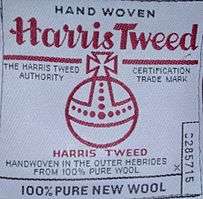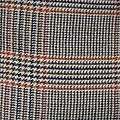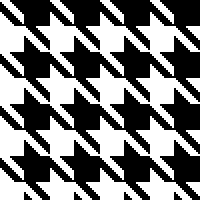Tweed (cloth)

Tweed is a rough, woolen fabric, of a soft, open, flexible texture, resembling cheviot or homespun, but more closely woven. It is usually woven with a plain weave, twill or herringbone structure. Colour effects in the yarn may be obtained by mixing dyed wool before it is spun.[1]
Tweeds are an icon of traditional Irish and British country clothing, being desirable for informal outerwear,[2] due to the material being moisture-resistant and durable. Tweeds are made to withstand harsh climate[3] and are commonly worn for outdoor activities such as shooting and hunting, in both Ireland and the United Kingdom. "Lovat" is the name given to the green used in traditional Scottish tweed. In Ireland, tweed manufacturing is most associated with County Donegal.
Etymology
The original name of the cloth was tweel, Scots for twill, the material being woven in a twilled rather than a plain pattern. A traditional story has the name coming about almost by chance. Around 1831, a London merchant received a letter from a Hawick firm, Wm. Watson & Sons, Dangerfield Mills about some "tweels". The merchant misinterpreted the handwriting, understanding it to be a trade-name taken from the river Tweed that flows through the Scottish Borders textile area. The goods were subsequently advertised as Tweed and the name has remained since.[4]
Associations

Traditionally used for upper-class country clothing like shooting jackets, tweed became popular among the Edwardian middle classes who associated it with the leisurely pursuits of the elite.[5] Due to their durability tweed Norfolk jackets and plus-fours were a popular choice[6] for hunters, cyclists, golfers and early motorists, hence Kenneth Grahame's depiction of Mr Toad in a Harris tweed suit.[7] Popular patterns include houndstooth[8] associated with 1960s fashion, Windowpane, gamekeeper's tweed worn by academics, Prince of Wales check originally commissioned by Edward VII, and herringbone.[9]
During the 2000s and 2010s, it was not uncommon for members of long-established British and American land-owning families to wear high quality heirloom tweed inherited from their grandparents, some of which pre-dated the Second World War.[10][11]
In modern times, cyclists may wear tweed when they ride vintage bicycles on a Tweed Run.[12] This practise has its roots in the British young fogey and hipster subcultures of the late 2000s and early 2010s, whose adherents appreciate both vintage tweed, and bicycles.[13]

Musical instruments
Some vintage Danemann upright pianos have a tweed cloth backing to protect the internal mechanism. Occasionally, Scottish bagpipes were covered in tweed as an alternative to tartan wool.[14]
Tweed is also sometimes found covering vintage or retro guitar amplifiers, such as the Fender tweed and Fender Tweed Deluxe.[15] This was widely used by country music and rock and roll artists of the 1950s and 60s, including Hank Thompson,[16] Dick Dale, Creedence Clearwater Revival's John Fogerty, and Eric Clapton.[17]
In fiction
Tweed was worn by many fictional characters from the Victorian and Edwardian periods, including the detective Sherlock Holmes. Basil Rathbone and Jeremy Brett both wore keeper's tweed deerstalkers and Inverness capes, but more recent portrayals of Sherlock have abandoned the hat. Although Robert Downey Jr's character wore a fedora, both he and Doctor Watson wore tweed overcoats, as was then fashionable in Victorian England. Due to the popularity of Benedict Cumberbatch's portrayal of Sherlock, the tweed overcoat entered high fashion in the 2010s.[18]
Television actors playing intellectuals or older men often wear Harris tweed, including Anthony Head in Buffy the Vampire Slayer and Mads Mikkelsen as Hannibal Lecter.[19] Notable movie characters who have worn tweed include Sean Connery in Indiana Jones and the Last Crusade, and Harrison Ford himself in the opening scenes of Indiana Jones and the Crystal Skull.
Additionally, windowpane tweed suits are frequently worn by actors portraying members of the English upper classes, such as Hugh Fraser in Agatha Christie's Poirot, Peter Davison as Campion, or the male cast of Downton Abbey.[20]
Tweed sportcoats were also worn by several incarnations of The Doctor from Doctor Who, including the Second Doctor, Seventh Doctor and Eleventh Doctor. For Matt Smith's Doctor, the BBC used cloth sourced from China rather than genuine Harris Tweed.[21]
Types of tweed
- Harris Tweed: The world’s only commercially produced handwoven tweed, defined in the Harris Tweed Act of 1993 as cloth that is "Handwoven by the islanders at their homes in the Outer Hebrides, finished in the Outer Hebrides, and made from pure virgin wool dyed and spun in the Outer Hebrides".[22]
- Donegal tweed: A handwoven tweed manufactured in County Donegal, Ireland. Donegal has for centuries been producing tweed from local materials. Sheep thrive in the hills and bogs of Donegal, and indigenous plants such as blackberries, fuchsia, gorse (whins), and moss provide dyes.
- Silk tweed: A fabric made of raw silk with flecks of colour typical of woollen tweeds.
Gallery
 Logo of the Harris Tweed authority
Logo of the Harris Tweed authority Prince of Wales check, frequently used to make overcoats and sportcoats in the 1950s
Prince of Wales check, frequently used to make overcoats and sportcoats in the 1950s Example of the herringbone pattern, a popular choice for suits and outerwear
Example of the herringbone pattern, a popular choice for suits and outerwear Houndstooth, the basis of the keeper's tweed popular among the upper classes from the 1860s until the 1930s
Houndstooth, the basis of the keeper's tweed popular among the upper classes from the 1860s until the 1930s Grey Donegal Tweed sportcoat
Grey Donegal Tweed sportcoat A deerstalker hat made of district or gamekeeper's tweed (contrasting mustard, green and brown checks)
A deerstalker hat made of district or gamekeeper's tweed (contrasting mustard, green and brown checks) Windowpane tweed popular in the late 19th century and again in the 1970s
Windowpane tweed popular in the late 19th century and again in the 1970s
 Hunting apparel belonging to Gustaf V of Sweden, 1930s.
Hunting apparel belonging to Gustaf V of Sweden, 1930s. Harris Tweed Nike
Harris Tweed Nike Tweed Fender guitar amplifier
Tweed Fender guitar amplifier- Charlie Hunter (left) watches as Old Tom Morris plays a shot in 1863 at Prestwick. Both of the players are wearing the traditional tweeds.
See also
- British Country Clothing
- Sports Jacket
- Norfolk jacket
- 2010s in fashion
- 2000s in fashion
- 1970s fashion
- 1960s fashion
- 1950s fashion
- 1920s in fashion
- Eleventh Doctor
Notes
- ↑ "Harris Tweed - The Cloth". harristweed.org.
- ↑ The Museum at FIT, Fashion Institute of Technology (2006), "The Tailor's Art," Menswear Fabrics - A Glossary, retrieved 2008-11-24
- ↑ "Cad & the Dandy - Tweed Jackets - Bespoke Tweed Jackets - Tweed Suits - Men's Tweed Suits". cadandthedandy.co.uk.
- ↑ Kirkpatric, Betty (August 6, 2015). Treacle, Toast and Tweed ... English Word Origins for Language Lovers. Crombie Jardine Publishing Limited.
- ↑ Edward Minister and Son (1873). "Gazette of fashion, and cutting-room companion". XXVII. Simpkin, Marshall & Co: 31.
- ↑ "How to wear a tweed suit in the 21st century". A Suit That Fits - Blog. Retrieved 2016-01-26.
- ↑ loopy_lucy14 (31 October 1997). "Mr. Toad's Wild Ride (1996)". IMDb.
- ↑ Dunbar, John Telfer: The Costume of Scotland, London: Batsford, 1984, ISBN 0-7134-2534-2, 1984 (paperback 1989, ISBN 0-7134-2535-0)
- ↑ Ralph Lauren Style Guide; polo.com Glossary, Herringbone, retrieved 2008-11-24
- ↑ "Grey Fox". greyfoxblog.com.
- ↑ "Richard Bath: In defence of tweed". scotsman.com.
- ↑ John Hutchinson (13 April 2013), "Doff your cap for the cyclists in tweed!", Daily Mail
- ↑ "#TheChapMag Vintage Garments". thechapmagazine.co.uk.
- ↑ Richard Price. "The Big Cloth and Me". thebigclothandme.blogspot.co.uk.
- ↑ Hunter, Dave (July 2012). "The Fender 5F4 Super Amp". Vintage Guitar. pp. 50–52.
- ↑ "Rock and Roll Fantasy?". google.co.uk.
- ↑ "Guitar Gods". google.co.uk.
- ↑ "It’s elementary – let’s have Holmes’s coat". telegraph.co.uk.
- ↑ "Rupert Giles (Character)". IMDb.
- ↑ "How to dress like Downton Abbey: Savile Row tailors showcase outfits of the 1920s at London Menswear Fashion Week". Mail Online.
- ↑ "BBC infuriates Scots by sourcing Doctor Who's 'Harris Tweed' jackets in China - Daily Mail Online". Mail Online.
- ↑ "About Us - Guardians of the Orb". harristweed.org.
References
- Dunbar, John Telfer: The Costume of Scotland, London: Batsford, 1984, ISBN 0-7134-2534-2, 1984 (paperback 1989, ISBN 0-7134-2535-0)
- The Harris Tweed Authority
- Rupert Giles IMDB Bio
- What is Tweed - Good description of tweed cloth
-
 Reynolds, Francis J., ed. (1921). "Tweed (cloth)". Collier's New Encyclopedia. New York: P.F. Collier & Son Company.
Reynolds, Francis J., ed. (1921). "Tweed (cloth)". Collier's New Encyclopedia. New York: P.F. Collier & Son Company. - National Library of Scotland: SCOTTISH SCREEN ARCHIVE (archive films relating to tweed manufacture in Scotland)
Fiona Anderson, 'Tweed', London: Bloomsbury Academic Press, 2016 ISBN 978-1-84520-697-0


.svg.png)